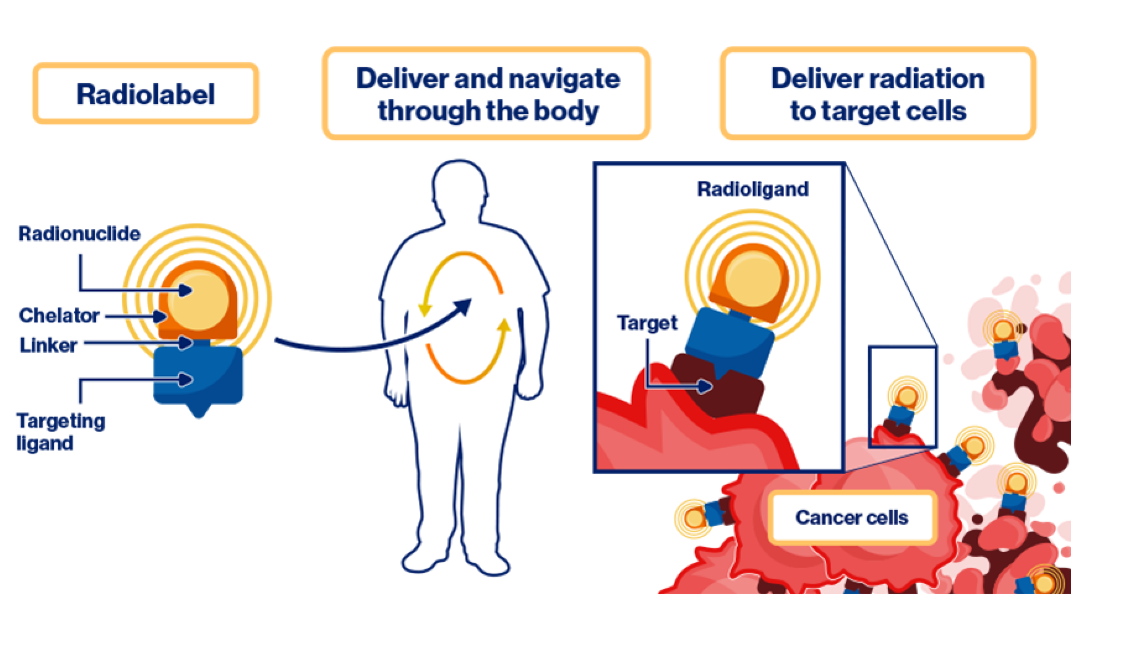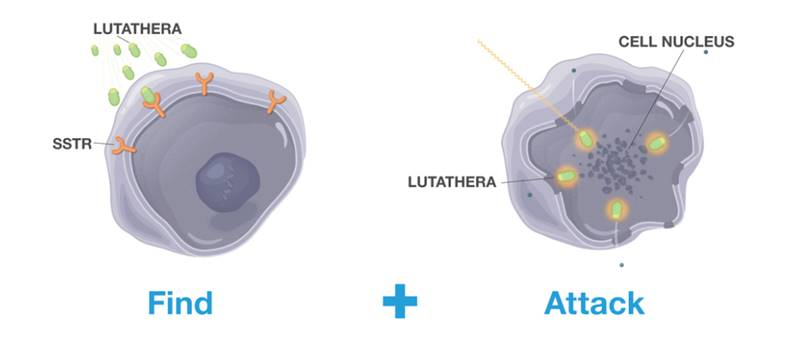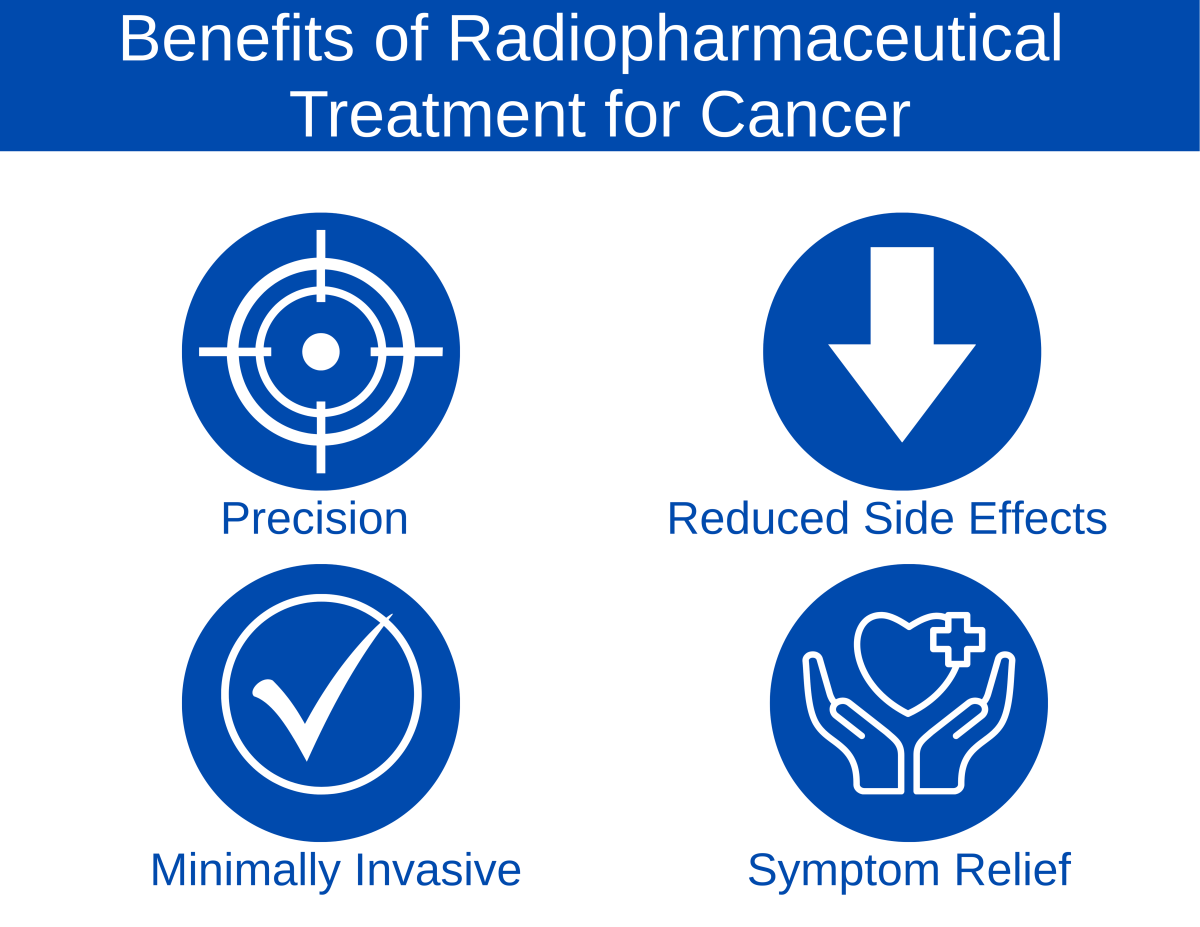Radiopharmaceuticals for Cancer Treatment
Radiopharmaceutical therapy is a new approach to cancer treatment that safely and effectively targets cancer at the cellular level. Unlike traditional radiation therapy, which uses a machine to deliver radiation from outside the body, or seeds that are implanted to deliver radiation over time. Many clinical trials were completed to introduce this promising cancer therapy category, with extensive research underway for additional uses.
Hematology Oncology Associates of Central New York is one of the only cancer centers in the region to offer this highly advanced treatment option. We are the only cancer center offering a multidisciplinary team approach to radiopharmaceutical treatment, including multiple board-certified medical oncologists, radiation oncologists, and PhD-trained radiation physicists.
At this time, radiopharmaceuticals are primarily used to treat prostate cancer and neuroendocrine tumors. However, there are many radiopharmaceutical treatments currently in clinical trials, our clinical research department will be offering several of those trials locally. Anyone interested in a clinical trial not currently listed on our website is welcome to contact our team at 315.472.7504, ext 1350, and we can help explore options for you.
How Radiopharmaceuticals Work
Radiopharmaceuticals work by identifying cancer cells and delivering radiation directly to them. In targeted radiopharmaceutical therapy, the medication contains an unstable isotope of an element that is radioactive. Radioactive isotopes are guided by molecules, such as monoclonal antibodies, to bind to specific targets on cancer cells while minimizing exposure to healthy cells. This allows the radiation to be delivered straight to the tumor, where it starts to destroy the cancer cells.
Cancer cells do not need to absorb radiopharmaceuticals for the treatment to be effective; simply attaching to the surface of the cells is sufficient. Once the radioactive compound binds to the cell, it emits radiation that penetrates the connected cell.

When Radiopharmaceuticals are Used
Currently, radiopharmaceuticals are used in combination with other treatments such as surgery, chemotherapy, external beam radiation, and immunotherapy.
For prostate cancer patients, a radiopharmaceutical called Pluvicto® is suggested for men with who have previously undergone other cancer treatments and have:
- prostate-specific membrane antigen(PSMA)-positive cancer
- metastatic cancer
- castration-resistant prostate cancer
Pluvicto uses a targeted therapy drug to identify the cancer cells in the body, delivering radiation only to those cells, sparing the healthy cells nearby.
Radiopharmaceuticals for those same types of prostate cancer can also be used as a first-line therapy, meaning the cancer has not received other treatments.

Xofigo® for Prostate Cancer That Has Spread to the Bones
Xofigo® is approved for men with metastatic castration-resistant prostate cancer (mCRPC) that has spread to the bones but not to other organs. Bone metastases are common in advanced prostate cancer and can cause significant pain and fractures. Xofigo mimics calcium and binds to areas of active bone metastases. It then delivers targeted radiation directly to tumors in the bone.
Benefits of Xofigo treatment include:
- Improved overall survival in appropriate patients
- Reduced bone pain
- Delayed skeletal-related complications such as fractures
Xofigo is administered as a brief intravenous injection once every four weeks for up to six treatments.
For patients with neuroendocrine tumors (NETs), Lutathera® is the radiopharmaceutical proven to slow the growth of neuroendocrine cancer cells in the pancreas and parts of the stomach. It’s also shown promising results as a first-line therapy for patients with advanced, somatostatin receptor-positive (SSTR+) gastroenteropancreatic neuroendocrine tumors (GEP-NETs).

Benefits of Treating Cancer with Radiopharmaceuticals
Radiopharmaceuticals offer several benefits for patients undergoing cancer treatment, including:
- Precision treatment: By specifically targeting cancer cells, this treatment method causes less damage to surrounding healthy tissues. Radiopharmaceuticals can reach difficult areas such as the bones, where cancer has spread, and that may be hard or impossible to treat with external radiation therapy.
- Symptom relief: Radiopharmaceuticals can help alleviate pain caused by tumors.
- Fewer side effects: Because healthy tissue experiences less damage compared to other cancer therapies, patients typically experience fewer side effects when treated with radiopharmaceuticals.
- Longer progression-free survival: Clinical research studies show that patients who receive radiopharmaceuticals as part of their cancer treatment experienced a longer time before the cancer recurred or progressed compared to the standard cancer treatment protocol.

What to Expect With Radiopharmaceutical Therapy
At Hematology-Oncology Associates of CNY, our radiation oncologists and PhD-trained radiation physicists oversee the use of radiopharmaceuticals as part of a personalized treatment plan. These therapies are typically administered through an injection into a vein.
Radiopharmaceutical infusions usually take a short amount of time and are performed in a specially constructed radiopharmaceutical suite in our Brittonfield center in East Syracuse. Many patients notice results after just one injection, while others may need up to five injections.
What Are the Side Effects of Radiopharmaceuticals?
The precise delivery of radiopharmaceuticals greatly reduces the likelihood of side effects. The most common side effects of radiopharmaceuticals include:
- Lowered blood cell counts
- Fatigue or tiredness
- Nausea and/or vomiting
- Dry mouth
- Joint pain
- Back pain
- Constipation
Patients using Lutathera may experience increased blood sugar (glucose) and lowered potassium levels.
Your radiation oncologist and team of oncology-certified nurses will monitor you closely during your infusion for any side effects. Be sure you talk with the team about how you feel after treatment. Your follow-up blood tests will let them know if there is a concern about your blood counts and potassium.
Expert Cancer Care from Specialists at Hematology-Oncology Associates of CNY
At Hematology-Oncology Associates of CNY, we proudly offer the latest cancer treatments, including radiopharmaceuticals administered for prostate cancer, to patients in the Central New York region. Our radiation and medical oncologists work together to review each patient’s needs and create a treatment plan that can include radiopharmaceuticals.
We have several locations, including East Syracuse, Camillus, and Auburn. We provide care for cancer patients in Onondaga County, Cayuga County, Oneida County, including Utica and Verona; Madison County, including Oneida, Jefferson County, including Watertown; and throughout Oswego County, including Oswego and Fulton.
